
by logisticsplus | Dec 7, 2015 | News
 Logistics Plus customers using eShipPlus™ for online rate quoting and shipment scheduling will now benefit from instant visibility to LTL guaranteed services and rates. In addition to competitive standard LTL freight rates for multiple top-tier carriers, you’ll now be able to see – and select – guaranteed delivery services where available. This provides you with the added flexibility to have peace-of-mind assurance that your shipment is going to deliver on the day the carrier says it will deliver – or your money back! Initially, only “afternoon” and “end of day” guaranteed services for select carriers will be displayed. Guaranteed morning delivery services will not be instantly shown at this time; but they are still available upon request.
Logistics Plus customers using eShipPlus™ for online rate quoting and shipment scheduling will now benefit from instant visibility to LTL guaranteed services and rates. In addition to competitive standard LTL freight rates for multiple top-tier carriers, you’ll now be able to see – and select – guaranteed delivery services where available. This provides you with the added flexibility to have peace-of-mind assurance that your shipment is going to deliver on the day the carrier says it will deliver – or your money back! Initially, only “afternoon” and “end of day” guaranteed services for select carriers will be displayed. Guaranteed morning delivery services will not be instantly shown at this time; but they are still available upon request.
When you use the Estimate Rate or Rate and Schedule tools, you’ll now see a “Guaranteed By” check box underneath the carriers with guaranteed services. It’s extremely important that you note any special pickup or delivery requirements in the SERVICES menu, such as liftgate service, inside delivery, residential delivery, delivery to a container freight station or airport, etc. In most cases, guaranteed service will not apply under those circumstances and eShipPlus will not show the guaranteed service option if you submit an accurate freight quote request.

If you select the check box, you’ll notice that your Total ($) price will be updated to reflect any up-charges applicable for this premium service.

Additionally, if you click the [+] next to your Total ($) price, you’ll see an exact breakdown of the total price and related fees.

Lastly, when you select your carrier – with the Guaranteed By box still checked – the appropriate verbiage will be automatically applied to your Logistics Plus bill of lading.
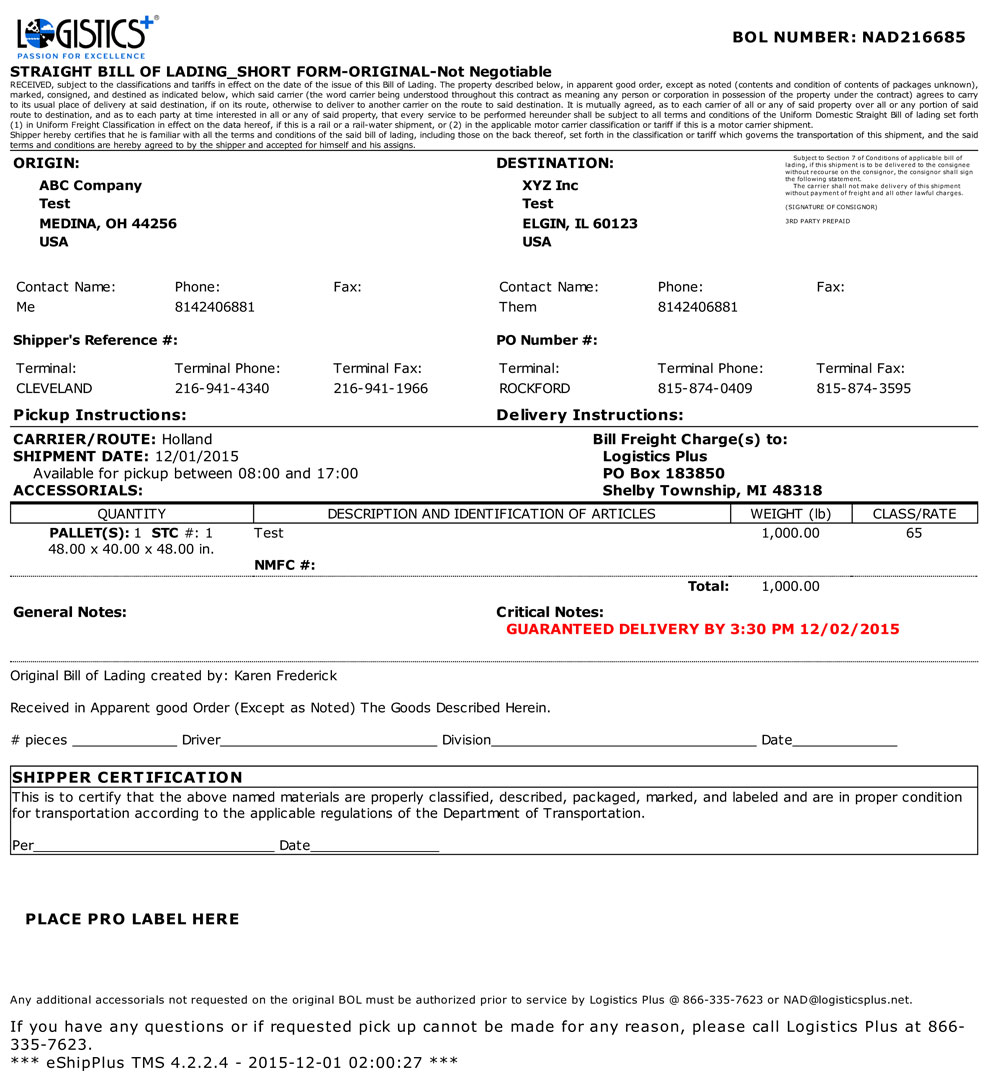

It’s important that you remind your driver at time of pickup that you have a guaranteed service shipment so they can ensure it is expedited through their system. As always, you can also call or email your Logistics Plus specialist with any questions or special requests. If your shipment is eligible for the selected guaranteed service, and if the carrier fails to deliver, Logistics Plus will back the service with a no-hassle, automatic zero-invoice guarantee. That means you can count on Logistics Plus to proactively track your shipment, and if it doesn’t deliver on-time, we’ll automatically cancel your freight charges on the shipment – there is no need to call us or file a claim.
If you’re a regular eShipPlus user, we hope you like this enhancement. If you’re new to Logistics Plus and not yet using our online eShipPlus tools, click here to request access today.
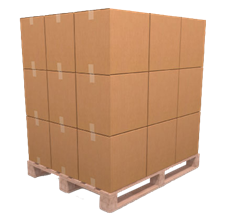
by logisticsplus | Dec 2, 2015 | News

LTL shipping refers to the process of transporting relatively small freight shipments that weigh anywhere between 150 to 10,000 lbs. Unlike Full Truck Load (FTL) prices, which are usually based on a more simplistic rate per mile system, LTL rates are calculated from several variable factors. Knowing these factors can be helpful in setting more realistic expectations and increasing long-term savings. Here are some factors used to determine LTL freight shipping rates:
Weight & Density
These two basic aspects of your shipment greatly determine how much you will be charged. Freight companies generally rate shipments at the lowest weight category and rate, meaning that the more a shipment weighs the less it costs per hundred pounds. Weight is also used to calculate density, and is one of the main components used to determine the classification of the shipment, which in turn affects the final rate. Logistics Plus provides a helpful, online freight density calculator if you want to quickly know the density of your shipment.
Freight Classification
The National Motor Freight Traffic Association (NMFTA) has established “freight classes” which are used to classify commodities for rating purposes. Classifications are based on the products’ density, stow-ability, value, handling and liability. Each commodity is categorized into one of 18 different freight classifications. Generally, the lower the freight class, the more dense the commodity, and, therefore, the lower the rate per hundred pounds. You can read more about freight classification on the Logistics Plus website.
Origin and Destination
Shipments that need to travel farther usually have higher rates as well. Shippers should find out which LTL carriers serve their intended destination to avoid interlining; a practice where one LTL carrier resorts to transferring its shipments to other carriers due to their limited reach. Interline shipments often tend to cost more and are more susceptible to loss or damage. Also shipments that require additional time or special equipment at time of pickup or delivery may also incur additional fees (called “accessorial fees” as discussed below). Examples include pickups or deliveries to residential locations, convention centers, construction sites, airports, wharfs, or container freight stations.
Base Rates
Ever since the industry was deregulated in the early 1980s, LTL carriers set their own base rates (i.e.,”list price”) from which discounts can be negotiated. Base rates can vary by company and by lane, making true apples-to-apples rate comparisons very difficult unless you know what you are doing. Logistics Plus provides shippers with the ability to request a free freight analysis if you’re unsure on how to compare rates to ensure you’re getting the best possible deal.
Absolute Minimum Charges
These are the minimum prices charged by LTL carriers, below which they will not go any lower – no matter what discounts may have been negotiated. The absolute minimum charge (MC) helps ensure carriers cover all of their fixed costs on a particular shipment or lane. If a high percentage of your shipments are small, or move across short distances, absolute minimum charges may play an important factor in your overall transportation spend.
Accessorial Fees
Accessorial fees apply when additional services are required to handle your shipment – those above and beyond the typical dock-to-dock pickup and delivery service most LTL carriers provide. Common examples include liftgate service, weekend delivery, and pickup or delivery at special origin and destination locations (as noted above). Fuel surcharges are the most common accessorial fee that LTL carriers charge since they are typically included on every shipment. Often times specific accessorial charges can be waived or reduced, so it’s important to understand how these fees impact your overall expenses and then include them in your negotiations.
Negotiating Rates
Shippers can save money on their LTL freight spend by negotiating base rates, discounts, and minimum charges with their LTL carriers. Alternatively, a professional freight management company, such as Logistics Plus, can negotiate with LTL carriers on your behalf. Top freight management companies are able to leverage their collective buying clout, analytical expertise, and carrier relationships to provide even greater savings to shippers, particularly those that are small or mid-sized companies.
If you feel like you’re spending too much on LTL freight, or if you lack the resources or expertise to negotiate your own rates, please consider working with Logistics Plus. As a top 50 freight brokerage firm, our LTL experts help hundreds of companies save on their LTL shipping every day. As mentioned earlier, we can provide you with a no-obligation freight analysis for multiple shipments, or we can help you get a quick and accurate freight quote for a single shipment.



by logisticsplus | Nov 19, 2015 | News
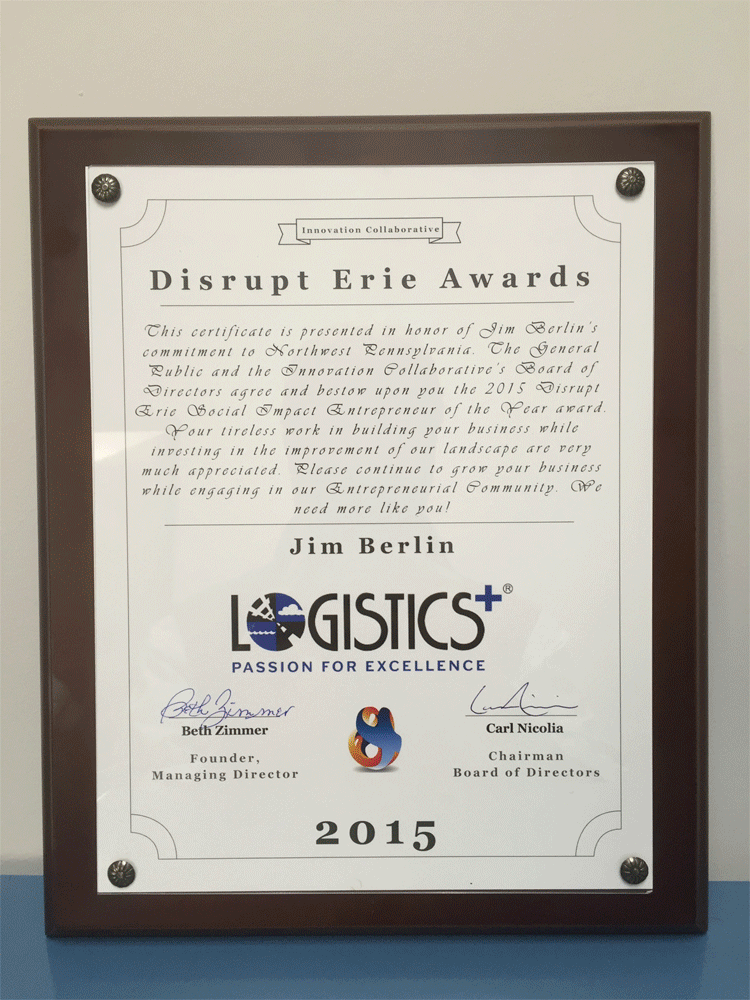 As we announced last month, Jim Berlin/Logistics Plus and LP Linguistic Solutions were both nominated for Disrupt Erie Awards by Innovation Collaborative. Winners were announced Wednesday night at Presque Isle Downs & Casino. As reported by Erie Times-News earlier this morning, the following winners were named:
As we announced last month, Jim Berlin/Logistics Plus and LP Linguistic Solutions were both nominated for Disrupt Erie Awards by Innovation Collaborative. Winners were announced Wednesday night at Presque Isle Downs & Casino. As reported by Erie Times-News earlier this morning, the following winners were named:
- Creative Entrepreneur of the Year: Margo Wolfe and Mark Tanenbaum, Performing Artists’ Collective Alliance.
- Erie’s Hero Award: O.G. Crawford and H.O. Hirt, founders of Erie Insurance.
- Social Impact Entrepreneur of the Year: Jim Berlin, founder of Logistics Plus.
- Startup Champion of the Year: Linda Stevenson, chairwoman of the Athena PowerLink program.
- Startup of the Year: Erie Ale Works.
- People’s Choice Award: Iron Empire Clothing.
Companies nominated for awards are driving change within the community and within their respective industries, and are making a lasting economic impact and creating lasting opportunities. The Social Impact Entrepreneur of the Year Award was based on a founder’s work that has had the most positive impact on the community’s well-being over the past year. All winners were chosen (50%) based on public input and (50%) based on the specific criteria listed on the nomination forms. Final judging was performed by Mr. Thom Ruhe and the Innovation Collaborative Board of Directors.
Congratulations to all of the winners in Innovation Collaborative’s first-ever Disrupt Erie Awards!


by logisticsplus | Nov 16, 2015 | News
 According to a U.S. Department of Commerce report, over 185,000 U.S. companies imported foreign goods in 2012, an increase of more than 10 percent from 2009. The majority of these businesses were small or medium-sized companies that may, in fact, lack the necessary resources to be a successful importer. If your business imports – or is planning to import – foreign goods, here are ten (10) keys to successfully navigating the complex waters of international trade.
According to a U.S. Department of Commerce report, over 185,000 U.S. companies imported foreign goods in 2012, an increase of more than 10 percent from 2009. The majority of these businesses were small or medium-sized companies that may, in fact, lack the necessary resources to be a successful importer. If your business imports – or is planning to import – foreign goods, here are ten (10) keys to successfully navigating the complex waters of international trade.
- Get a Formal Contract
Before purchasing and importing foreign products, make sure you issue a formal written document that includes all of the significant issues to the buyer and seller, such as product acceptance, warranties and dispute resolution procedures. Otherwise, you will expose your business to significant risks which may be very difficult to control
- Familiarize Yourself with U.S Customs Policies & Procedures
It is essential that you fully understand whether or not importing your product will require a license or permit. Although the U.S Customs and Border Protection (CBP) does not generally require importers to have a license or permit, there are other agencies that may require one; examples include the FDA, USDA and the ATF. Furthermore, there are certain goods that may be subject to specific requirements with regards to their testing, marketing, certification, labeling, packaging and documentation. To get more acquainted with these requirements, you can visit www.cbp.gov (or see key #10 below).
- Make Sure You Understand Incoterms
This may be a no-brainer, but it is always important to understand the deal in which you are getting yourself. Suppliers are obliged to submit a term of sale alongside each quotation submission. It is your responsibility to fully understand the costs, rights and obligations included in these Incoterms. This will also help you estimate your costs more accurately (if you’re confused about Incoterms, see key #10 below).
- Classify Your Products Properly
The harmonized tariff schedule classification (HTS) of a product is what determines the rate of duty applied to it. Therefore, it is very important that you assign the correct classification to your products. This will not only reduce your duties, but will also ensure you don’t face additional obstacles when your goods enter the United States. To learn more about this process, talk to someone familiar with HTS classifications (or see key #10 below).
- Consider Preferential Duty Programs
There are many preferential duty programs out there that can help you avoid certain duties and reduce your transaction costs. The Generalized System of Preferences, in addition to free trade agreements that the U.S. has in force with 20 countries, can give you a competitive advantage in the global market place (or see key #10 below).
- Research Import Quota Requirements
These refer to quotas that limit the amount of imported commodities into the United States within a specified amount of time. Some quotas allow goods to continue entering the United States after the limit has been reached but at a higher rate of duty, these are called tariff rate quotas (If you’re not sure if your product has an import quota, then see key #10 below).
- Find a Reliable and Legitimate Foreign Seller
Before making any final transactions, you need to ensure that the seller which you are dealing with is reliable. This is when you should conduct extensive research in terms of their reputation, financial status, and overall history. Doing business with unfamiliar suppliers can be risky, so you have to always be prepared.
- Pick the Right Insurance Coverage
There are many things that could happen to your goods on their way to their final destination – from severe weather conditions to rough handling by carriers, you can never be over-prepared. It is, therefore, very crucial that you accurately determine the type, amount, and extent of insurance coverage that you may need. You should also know who will be responsible for insuring your goods when they are not in your possession. Always make sure you have proof of insurance from your sellers, and never only take their word for it.
- Keep Records of Everything
U.S. CBP laws require importers to keep records of all documents relating to imports for a period of five years. These records may be inspected at any time in order to check your compliance status to all U.S. CBP laws (if you’re not sure what documents to keep, see key #10 below).
- Hire an Experienced Customs Broker!
If you’re new to importing – or even if you’re not – you may want to consider hiring a freight forwarder that is also a professional customs broker, like Logistics Plus (LP), to help you with all of your importing procedures. The LP Customs Broker Solutions team can help simplify the process, and ensure you abide by all rules and regulations, thus minimizing any potential future problems. If you have any questions specific to import customs rules or duties, feel free to contact Gretchen Blough, our Customs Brokerage Manager, at gretchen.blough@logisticsplus.com.

If you’re ready to import a shipment or need help with an international air or international ocean freight quote, please send an email to imports@logisticsplus.com (or click the button below).

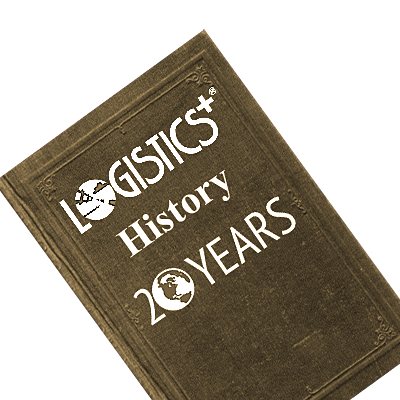
by logisticsplus | Nov 6, 2015 | News
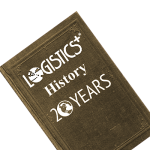 As we celebrate our 20th year of business, we continue our walk down memory lane by sharing the following Erie Times-News newspaper clipping from December 3, 2003. This article was a follow-up to the formal announcement on October 31 that same year. It details the formal ceremony – held exactly 76 years after the building was officially opened – in which Logistics Plus founder, Jim Berlin, discusses his $1 million renovation plans for Erie’s Union Station (you can click the news clipping below to view a slightly larger image).
As we celebrate our 20th year of business, we continue our walk down memory lane by sharing the following Erie Times-News newspaper clipping from December 3, 2003. This article was a follow-up to the formal announcement on October 31 that same year. It details the formal ceremony – held exactly 76 years after the building was officially opened – in which Logistics Plus founder, Jim Berlin, discusses his $1 million renovation plans for Erie’s Union Station (you can click the news clipping below to view a slightly larger image).
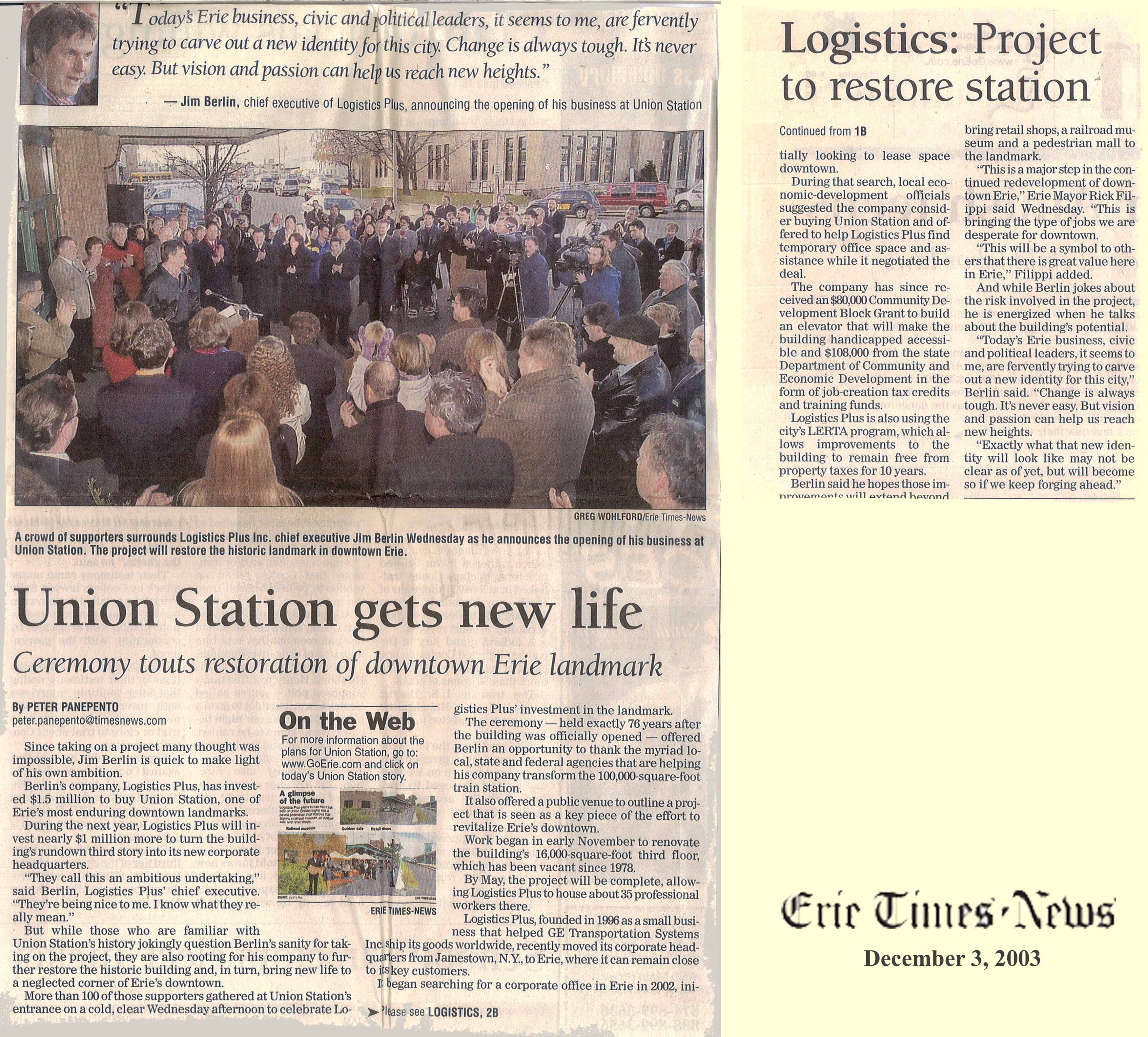

 Logistics Plus customers using eShipPlus™ for online rate quoting and shipment scheduling will now benefit from instant visibility to LTL guaranteed services and rates. In addition to competitive standard LTL freight rates for multiple top-tier carriers, you’ll now be able to see – and select – guaranteed delivery services where available. This provides you with the added flexibility to have peace-of-mind assurance that your shipment is going to deliver on the day the carrier says it will deliver – or your money back! Initially, only “afternoon” and “end of day” guaranteed services for select carriers will be displayed. Guaranteed morning delivery services will not be instantly shown at this time; but they are still available upon request.
Logistics Plus customers using eShipPlus™ for online rate quoting and shipment scheduling will now benefit from instant visibility to LTL guaranteed services and rates. In addition to competitive standard LTL freight rates for multiple top-tier carriers, you’ll now be able to see – and select – guaranteed delivery services where available. This provides you with the added flexibility to have peace-of-mind assurance that your shipment is going to deliver on the day the carrier says it will deliver – or your money back! Initially, only “afternoon” and “end of day” guaranteed services for select carriers will be displayed. Guaranteed morning delivery services will not be instantly shown at this time; but they are still available upon request.














 As we celebrate our
As we celebrate our 